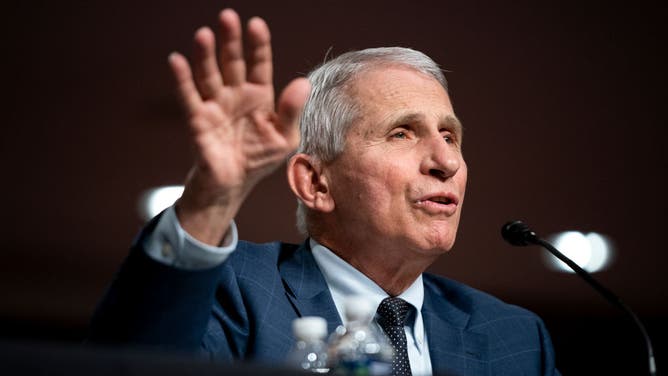Fauci ‘Prompted’ Release of Paper Inaccurately Debunking Lab Leak, According to New Evidence
Dr. Anthony Fauci was instrumental in the release of an early paper attempting to “disprove” the lab leak theory for the origins of COVID.
That’s according to new evidence uncovered by a GOP-led House committee.
The Majority Staff on the Select Subcommittee on the Coronavirus Pandemic released a memo saying that they’d discovered Fauci “prompted” other scientists to write a paper on COVID origins.
"New evidence released by the Select Subcommittee today suggests that Dr. Fauci ‘prompted’ the drafting of a publication that would ‘disprove’ the lab leak theory, the authors of this paper skewed available evidence to achieve that goal, and Dr. Jeremy Farrar went uncredited despite significant involvement," the memo reads.
The Wuhan lab, outside of certain media outlets, has been increasingly determined as the likely source for the start of the pandemic.
READ: WASHINGTON POST DISMISSES LAB LEAK THEORY DESPITE NEW EVIDENCE
Almost immediately after the initial outbreak, Fauci downplayed the lab leak as a potential explanation.
The memo claims, however, that Fauci and former NIH director Francis Collins were alerted to the possibility almost immediately.
According to Fox News, the memo states that they were warned on a Feb. 1, 2020 conference call that the virus could have been intentionally manipulated and may have come from the lab.

Fauci Privately Frustrated At Message Sent By Holding WHCA Dinner, Per Reports. (Photo by Greg Nash-Pool/Getty Images)
Fauci Instrumental in Inaccurate Paper
Just a few days after that conference call, some of the participating scientists drafted a paper called “Proximal Origin,’ that claimed the virus occurred naturally.
Fauci and Collins then worked together to use that paper to publicly “debunk” the lab leak theory.
"On April 16, 2020, slightly more than two months after the original conference call, Dr. Collins emailed Dr. Fauci expressing dismay that Proximal Origin—which they saw prior to publication and were given the opportunity to edit—did not squash the lab leak hypothesis and asks if the NIH can do more to ‘put down’ the lab leak hypothesis," the memo reads. "The next day—after Dr. Collins explicitly asked for more public pressure—Dr. Fauci cited Proximal Origin from the White House podium when asked if COVID-19 leaked from a lab."
Despite associated scientists repeatedly denying Fauci’s involvement and input, the committee members said that’s not accurate. One such example was Dr. Kristian Anderson, who told House members that Fauci didn’t influence the paper’s conclusions.
"On August 18, 2021, Scripps responded to then-Committee on Oversight and Reform Ranking Member, James Comer, and then-Committee on the Judiciary Ranking Member, Jim Jordan’s, July 29, 2021, letter to Dr. Andersen," the memo says. "In this letter, Scripps asserts that Dr. Andersen "objectively" investigated the origins, and that Dr. Anthony Fauci did not attempt to influence his work. Both statements do not appear to be supported by the available evidence."
Politically Motivated Dismissals
The memo goes further on Kristian Anderson’s surprising about face on the lab leak evidence.
While publicly saying that data from pangolins pointed to a natural origin, he had wildly different conclusions.
“Privately, Dr. Andersen did not believe the pangolin data disproved a lab leak theory despite saying so publicly. It is still unclear what intervening event changed the minds of the authors of Proximal Origin in such a short period of time. Based on this new evidence, the pangolin data was not the compelling factor; to this day, the only known intervening event was the February 1 conference call with Dr. Fauci."
What a surprising coincidence that a conversation with Dr. Fauci moved the scientists away from the lab leak hypothesis!
Fauci had a vested interest in diverting attention away from the Wuhan Institute of Virology, considering NIH had indirectly funded work there.
On the same day of the conference call, Fauci emailed one of his top employees that they needed to speak, urgently.
Emails point to his concern over gain-of-function research as the potential subject of conversation.
The implication of the House committee’s memo is that Fauci implored the researchers on the conference call to write a paper “debunking” the lab leak to help protect his organization.
Even though many involved were uncertain about the evidence, or favored a lab origin, they complied.
Fauci Used His Power
Those same scientists then denied that Fauci was instrumental in organizing the paper and its conclusions.
Fauci’s influence, funding power and the realization that the lab leak could draw unwanted scrutiny were enough to sway opinions.
Scientists and researchers previously enjoyed the ability work mostly in obscurity, with many favoring risky experiments despite safety concerns.
The lab leak hypothesis gaining traction would have brought attention and potentially a loss of resources. So they published with undeserved certainty when none was warranted.
Intellectual honesty has not been a strong suit of the “expert” community during the pandemic. Especially with regards to Dr. Fauci.
And this new evidence shows that those concerns go even deeper than previously realized.